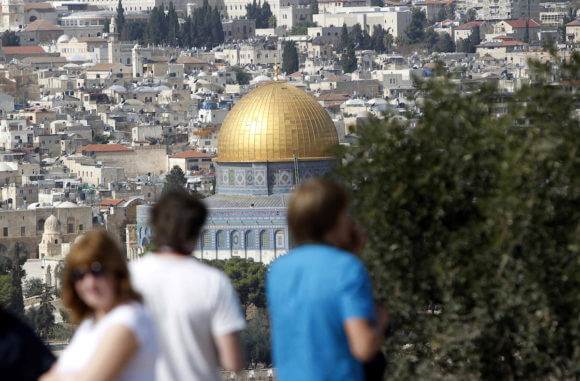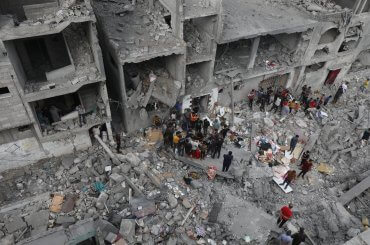Earlier this week, an Israeli member of parliament publicly suggested that the Al-Aqsa Mosque should be divided between Muslims and Jews, confirming fears long held by Palestinians over Israel’s future goals for control over the holy site.
The plan was proposed by Amit Halevi, a member of Prime Minister Benjamin Netanyahu’s ruling Likud party, in an interview with an Israeli newspaper.
Halevi suggested that the holy site be split into 30% for Muslim worship and 70%, including the area where the Dome of the Rock is, for Jewish worship and control.
“If they pray there, it does not make the entire Temple Mount a holy place for Muslims,” Halevi said, using the Jewish term of Temple Mount to refer to Al-Aqsa, Middle East Eye reported. “It wasn’t and it won’t be.”
For decades, Palestinians have sounded alarms over Israeli efforts to exert more control over the Al-Aqsa Mosque compound, which is the third holiest site in Islam, and the holiest site in the Jewish religion. In recent years Israeli police raids into the compound have become more frequent and more violent. Settler incursions and Jewish worship at the site — forbidden as part of the “status quo” — are increasingly frequent, while Palestinian access to the site is being progressively restricted.
During Passover this year, which coincided with the Muslim holy month of Ramadan, settler groups offered cash rewards to any Jew who sacrificed an animal in the compound or got arrested trying to do so, further provoking Palestinians, who at the same time, were under attack by Israeli forces.
All of these changes on the ground, coupled with recent inflammatory tours by right-wing ministers like Itamar Ben-Gvir, who has openly said, “we are in charge here” while inside the compound, point towards a future in which Halevi’s proposal doesn’t seem so far beyond the realm of possibility.
Following the election of a hardline right-wing government in 2022, the voices of Jewish religious nationalists like Ben-Gvir, who hold some of the highest positions of power in the new government, have become more prominent.
This has meant that the voices calling for Jewish control over the site, and even the destruction of the mosque, are no longer fringe extremists but mainstream politicians occupying key positions of power within the new government. These top ministers provide backing and legitimacy to hardline Zionist groups, such as the Temple Mount Faithful, which seek to take over the Aqsa Mosque and build the Third Temple in its place.
Moreover, many figures in Israeli society and politics want the Muslim and Palestinian identity of the site to be replaced with a Jewish one. And slowly but surely, by changing facts on the ground and introducing plans like Halevi’s into the mainstream consciousness, that reality is taking shape.
Such statements like those of Halevi’s can no longer be disregarded as extremist ideations and fantasies, but should be taken at face value: Al-Aqsa is under attack.
What does the division plan look like?
In addition to suggesting the Al-Aqsa Mosque compound, which in total spans around 35 acres inside Jerusalem’s Old City walls, be split into Muslim and Jewish sites of worship, Halevi also laid out the plans for complete Israeli control over the site — both the proposed Muslim and Jewish sections.
In his interview, Halevi also called for expanding and easing Jewish access to the site and suggested that Jordan’s administration of Al-Aqsa be revoked, Middle East Eye reported. Essentially, Halevi wants a complete overhaul of the status quo of the site — a very fragile international agreement, upon which Israel is a signatory, that recognizes Jordanian custodianship over the site and has been increasingly threatened and violated by Israel in recent years.
According to the agreement, the site is under the administrative authority of the Jordanian-controlled Jerusalem Islamic Waqf. The status quo also allows for non-Muslim visitation but no non-Muslim worship.
While on paper Jordan is still the custodian of the site, Israel already has full control over access to it, with checkpoints at all the gates manned by armed Israeli border police officers who determine who goes in or out. This control also translates into frequent Israeli raids on the site and inside the mosque, as well as the facilitation of settler and Israeli government minister raids into the compound.
Essentially, there is the “status quo” on paper and the actual status quo that Israel has been enforcing on the ground for decades. Which begs the question, would Halevi’s proposal of revoking Jordanian custodianship really be that drastic of a change, or would it simply be formalizing Israel’s existing de facto control over the site?
No matter which way you look at it, however, Palestinians stand to lose.
Total Israeli control would mean even more restrictions on Palestinian access to the holy site, which, in addition to being a religious sacred space, is also politically symbolic of Jerusalem’s Palestinian identity.
That’s why dividing Al-Aqsa and taking control over it wouldn’t just threaten the religious identity of the site — which is sacred to 1.8 billion Muslims worldwide — but would further threaten an already shrinking Palestinian existence in Jerusalem.
Could Israel really divide the Al-Aqsa Mosque?
The most explosive and revealing part of Halevi’s interview was when he suggested that the Al-Aqsa Mosque compound, which in total spans around 35 acres inside Jerusalem’s Old City walls, be split unequally, with 70% allotted for Jewish worship.
The suggestion to divide the site, which is designated solely for Muslim worship according to international agreements (to which Israel is a signatory), and hand the vast majority over to Jewish worshippers, while shocking, did not feel surprising.
The plan was reminiscent of many similar divisions in modern Palestinian history — think, the UN partition plan for Palestine in 1947, which gave more than 50% of Palestine to a Jewish state; or more recently with Israel’s division of holy sites in Palestine, like the Ibrahimi Mosque in Hebron, and Rachel’s Tomb in Bethlehem.
In 1994, following the massacre of 29 Palestinian Muslim worshipers by a Jewish-American settler in Hebron, Israel divided the Ibrahimi Mosque (where prophet Abraham, his wife Sarah, and their progeny are believed to be buried) under the pretext of “security concerns.” The mosque, which at the time was a place of exclusive Muslim worship, was suddenly divided into a Mosque (40%) and a Synagogue (60%), with separate entrances for the two.
Today, the Ibrahimi mosque is a heavily militarized area — for Palestinians. To access the mosque, Palestinians must pass through a number of Israeli military checkpoints, including metal gates, electronic turnstiles, and biometric screenings. Worshipers are also under constant surveillance by a network of cameras.
The same is true for Rachel’s Tomb, which is believed to be the place where Rachel, the wife of Jacob, passed away. A holy site for Jews, Muslims, and Christians, the site was completely closed off to Palestinians and the residents of Bethlehem in 2002 when Israel built the Separation Wall around the tomb, effectively annexing it and turning it into a site now accessible primarily to Jewish worshipers, or those who can access it from the other side of the wall. The area around the tomb has also been turned into a permanent military base and the Israeli army’s central command in the heart of Bethlehem City, from which Israeli forces routinely shoot at and kill Palestinians.
The fact that Israel has tried and true experience of dividing and conquering Palestinian land and holy sites, all in plain sight of the international community, has naturally made Halevi’s statements incredibly worrying to Palestinians.
If Israel has already been so successful in the division and takeover of Palestinian holy sites, what’s to stop the state from doing the same with the Al-Aqsa Compound, which is regarded as the holiest site in Judaism?
Since the establishment of the state, Israel has been working towards full control over Jerusalem and the Al-Aqsa Mosque compound, despite the fact that the city is illegally occupied and that international law stipulates that the occupying power has no sovereignty over that territory, and thus cannot make any permanent changes to it.
During Israel’s occupation of the city in 1967, it completely destroyed an entire Palestinian neighborhood, the Moroccan quarter, in order to expand it into what is now the Western Wall Plaza to facilitate the easy entry of Jewish worshipers to the Western Wall bordering the Al-Aqsa compound. In 2003 Israel permanently closed off one of the gates to the compound, Bab al-Rahma. Another gate, the Moroccan Gate, Bab al-Magharib, has also been completely taken over by Israeli armed forces, is completely off-limits to Palestinians, and is used to facilitate Jewish settlers into the compound. In recent years, Israel established a permanent military watchtower and base outside Damascus Gate, the entrance to the Muslim Quarter, and in 2017 tried — but failed due to popular Palestinian civil disobedience — attempted to install metal detectors at the gates to the mosque.
If history is any indication, the only backlash that Israel will face will likely be from Palestinians themselves, while the international community stands by issuing conciliatory statements and appeals for “calm” and the maintenance of the “status quo.”



I am not familiar with the layout of the disputed area, but is there no way for both Muslims and Jews to worship there?
Perhaps a negotiation toward sharing the Mount in a sensitive way could create goodwill toward an overall settlement. It reasonably could have made a positive difference if, during Israel’s presidential address at last years Independence ceremony at the Wall, a compromise had been reached on turning down the volume of the mosque loudspeaker.
He has denied the aspect of the physical division of the Temple Mount (in Hebrew) https://www.makorrishon.co.il/opinion/627879/